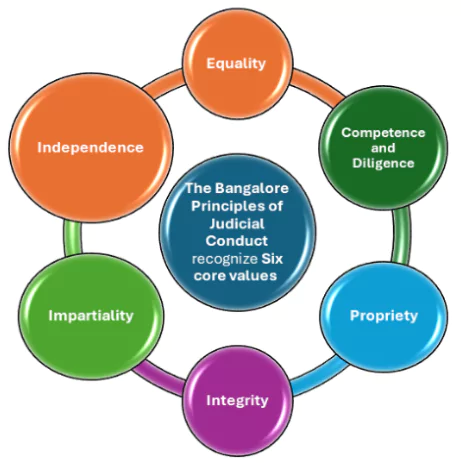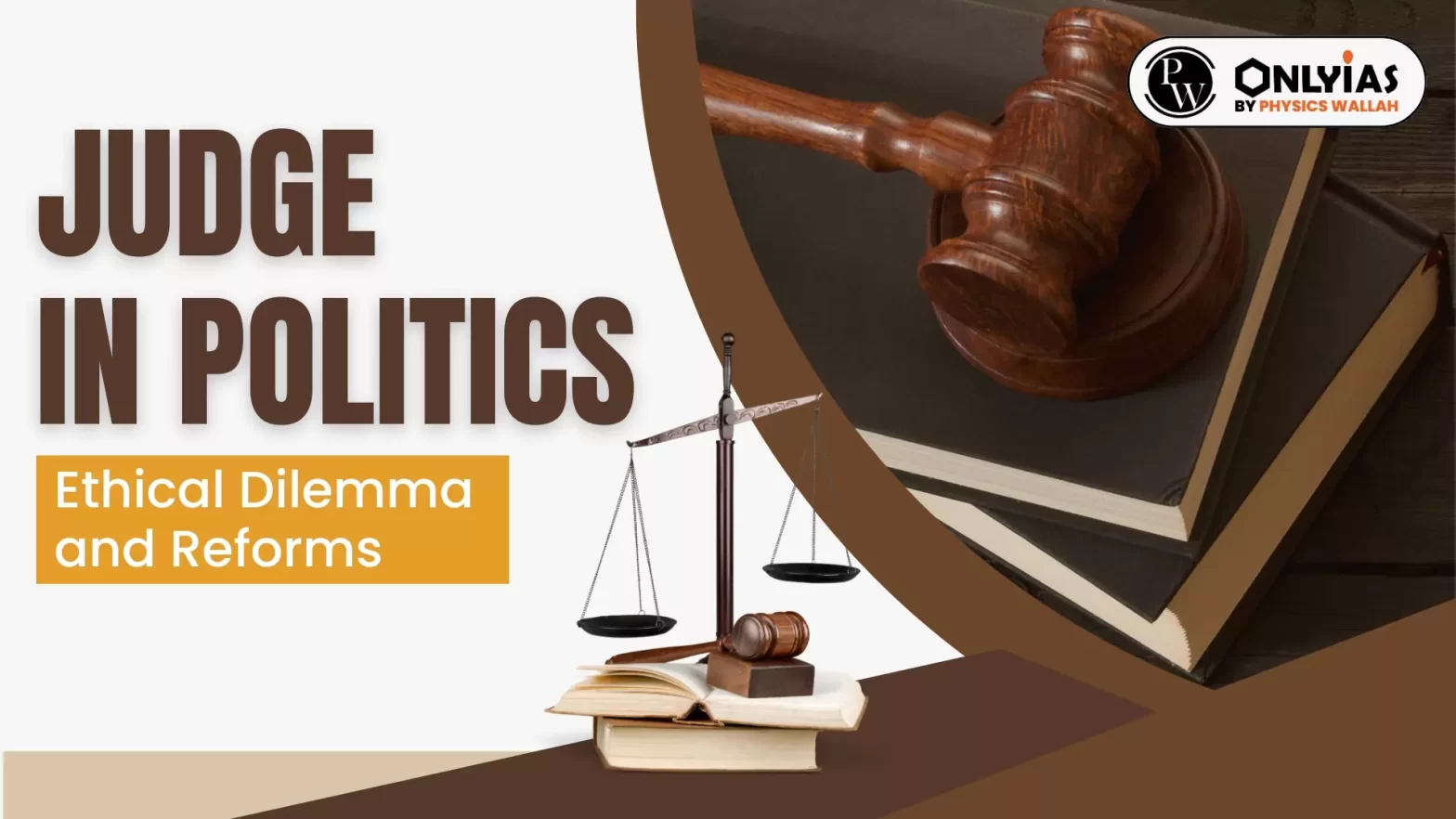Context
This Article is based on the news “On judges and bureaucrats joining politics” which was published in The Hindu.
Recently, a Calcutta High Court judge resigned from their posts and joined political parties, raising questions of propriety, impartiality and neutrality about the independence of the Constitutional authorities. The implications of a Judge in Politics underscore the need for robust safeguards to preserve the integrity and independence of Constitutional authorities.
Judges in Politics: Exploring Crossroads of Judicial and Political Realms
- The first such example came in 1967. The former Chief Justice of India (CJI) Koka Subba Rao resigned three months before retiring to contest the Presidential election.
- The second example is of former Supreme Court Justice Baharul Islam. In 1983, he resigned six weeks before retirement to contest the Lok Sabha polls.
- Recently, a retired Chief Justice of India, Ranjan Gogoi was nominated to the Rajya Sabha in 2020 within four months of his retirement.
- In 2004, a former Chief Election Commissioner became a Rajya Sabha member and Minister three years after retirement.
- There have also been occasions where retired Comptroller and Auditor General (CAG) and judges have been appointed Governors of States.
|
Various Ethical Concerns with the Entry of Judge in Politics:
- Against Constitutional Value: The third Schedule (deals with oath taking) of the Indian Constitution asks to swear that the judge will perform his/her duties without fear, favour, affection or ill-will.
- At the same time, their political entry raises questions over impartiality and propriety.
- Erosion of Public Trust: The entry of judges in politics can lead to trust erosion in the overall judiciary.
- In C. Ravichandran Iyer vs Justice A.M. Bhattacharjee, 1995, The SC held that to keep the stream of justice clean and pure, the judge must be endowed with sterling character, impeccable integrity and upright behaviour.
- In All India Judges’ Association vs Union of India, 1991: The SC highlighted the significance of society’s expectation from judicial officers. The ideals are violated when judges compromise on their neutrality.Breach of Judicial Impartiality: The entry of judges into politics attracts questions about the impartiality of orders delivered by the judge during their tenure.
- Judges are expected to remain neutral and make decisions based solely on the facts and the law.
- Against the Principle of Checks & Balances: The Constitution works on the principle of checks and balances between various organs.
- The executive is accountable to the legislature and an independent judiciary keeps a check on both legislatures and executives.
- Restrictions on Judiciary: A judge of a Supreme Court after ceasing to hold office cannot appear as a lawyer before any court or authority in India.
- A judge of a High Court has similar restrictions except for appearance before the Supreme Court or other High Courts.
- Undermine Judicial Independence: The entry of judges in politics raises questions about judicial independence and the influence of political considerations on the judiciary’s functioning.
 However, Judicial independence is significant for maintaining the rule of law.
However, Judicial independence is significant for maintaining the rule of law.
- Violation of Bangalore Principles of Judicial Conduct, 2002: It deals with the judicial values and asks judges to ensure that their conduct both in and out of (the) court maintains and enhances the confidence of the public and the legal profession in the impartiality of the judges.
- Conflict of Interest: The entry of judges in politics, particularly after making controversial statements and rulings (during serving), raises concerns over conflicts of interest.
- However, judges are expected to avoid conflicts of interest and maintain their integrity.
- Issue of Post-Retirement Appointments: Over the years, some retired judges have accepted government posts after retirement that are against the Constitutional value of maintaining a strike balance between the judiciary and the executive.
- Against the Ethical Conduct of Judges: The entry of judges in politics is against the ethical conduct of judges.
- However, judges are expected to maintain dignity inside and outside the courtroom to enhance public confidence in the judiciary by exhibiting their independence, impartiality, integrity, decency, and diligence.
Guiding Principles: Judges in Politics and the Restatement of Values of Judicial Life
- The Supreme Court adopted a charter called the “Restatement of Values of Judicial Life” on 7th May 1997. It is a code of judicial ethics and serves as a guide for an independent and fair judiciary, paving the way for the impartial administration of justice.
- It comprises 16 points which are classified into the following sub-heads:
- Impartiality: Justice must not only be done but also be seen to be done. Judges’ behaviour should reaffirm people’s faith in the judiciary’s impartiality.
- Avoiding Conflicts: Judges should avoid close associations with individual members of the Bar, and refrain from hearing cases involving family members who are lawyers.
- No Other Office: A judge should not contest the election to any office of a club, society or other association; further he shall not hold such elective office except in a society or association connected with the law.
- No Favouritism/Tilting: No member of his family who is a member of the Bar, shall be permitted to use the residence in which the judge resides or other facilities for professional work.
- A judge shall not hear and decide a matter in which a family member, a close relation or a friend is concerned.
- Aloofness: A judge should practice a degree of aloofness consistent with the dignity of his office.
- A judge shall not enter into public debate or express his views on political matters or matters that are pending or are likely to arise for judicial determination.
- A judge is expected to let his judgments speak for themselves and shall not give interviews to the media.
- Maintain Diligence: A judge shall not accept gifts or hospitality except from his family, close relations and friends.
- A judge shall not speculate in shares, stocks or the like.
- A judge should not engage directly or indirectly in trade or business by himself or in association with any other person.
- A judge should not ask for, accept contributions or otherwise actively associate himself with raising any fund for any purpose.
- Financial Benefits: Judges should not seek financial benefits unless available and should not speculate in shares or engage in trade or business.
- Public Gaze: Judges must always be conscious that they are under public scrutiny, and their actions should benefit their high office.
|
Way Forward
- A Legal Rule & Action: The time has come for the Indian judiciary and legislative bodies to reconsider and potentially reform the rules governing post-retirement activities of judges and judge-made law on this issue (since Parliament has no incentive to correct it).
- Implement a Cooling-Off Period: While the opinion of the Attorney General is based on sound legal principles, prescribing a cooling-off period of say at least two years for joining political parties or being nominated to political posts by the government is desirable to instill confidence in the public at large and negate any allegation of quid pro quo.
Recommendations by the Election Commission:
- In 2012: The EC recommended that the Union government provide a cooling-off period for top bureaucrats after their retirement before joining political parties and contesting elections.
- However, the Government rejected this recommendation based on the opinion of the Attorney General that this may not be in line with constitutional provisions and democratic values.
- Views of Attorney General: One of the essential features of a democracy is every citizen’s right to contest elections. The maintenance of independence and neutrality will be relevant during the period a person is in service.
- Placing such a restriction against officials contesting polls may not be a valid classification and would not be in harmony with democratic principles in the Constitution.
|
-
- Former Chief Justice R M Lodha recommended a cooling-off period of at least two years between a judge’s retirement and their eligibility for any post-retirement assignment to mitigate potential conflicts of interest and ensure impartiality.
- Recommendations of Law Commission: The 14th Law Commission Report, 1958 advocated for a system that ensures financial security to the judges without compromising independence.
- Enhance Judicial Ethics and Standards: There is a need to strengthen the ethical guidelines and standards during their tenure and post-retirement. It can help maintain the integrity and impartiality of the judiciary.
- Judges should be encouraged to prioritise public trust and confidence in the judiciary over personal interests.Increase Transparency: There should be greater transparency in appointing retired judges to post-retirement positions, such as disclosing the selection criteria, ensuring open competition, and publicising the reasons behind each appointment. Enhance Judicial Education and Training on ethical issues, human rights, and international legal standards. These are essential for maintaining high standards of judicial conduct and competence.
- Learn from & Follow the Best Practices: United States: In the US, the Supreme Court justices do not retire but hold their positions for life to prevent conflicts of interest.
- United Kingdom: In the UK, while there is no law preventing judges from taking post-retirement jobs, no judge has done so, reflecting a different approach to the issue of post-retirement roles.
- Article 17 of the European Council of Judges (CCJE): It recognises judges’ rights to a fair process and underscores the necessity for judicial actions to satisfy the requirements of judicial ethics and impartiality, national or international.
- Model Code of Judicial Conduct for Indian Court Judges: It encourages fairness and due process in court proceedings, emphasising the integrity and independence of the judiciary, the avoidance of impropriety and the diligent and impartial performance of judicial duties.
- It also advises judges on regulating extrajudicial activities to minimize conflicts with judicial responsibilities and avoid inappropriate political activity.
- Canons of Judicial Ethics: As discussed in the First M.C. Setalvad Memorial Lecture, it provides a detailed definition of judicial ethics, emphasizing the necessity for judges to exhibit integrity and upright behavior.
Conclusion
The entry of judges into politics highlights and raises ethical concerns that need to be addressed as soon as possible. There is a need to implement reforms such as a mandatory cooling-off period, enhancing existing judicial conduct codes, strengthening the selection process, ensuring accountability, decentralising power, strengthening civil society, etc.
Read More About: Politicization of Bureaucracy and Its Consequences
![]() 14 Mar 2024
14 Mar 2024

 However, Judicial independence is significant for maintaining the rule of law.
However, Judicial independence is significant for maintaining the rule of law.